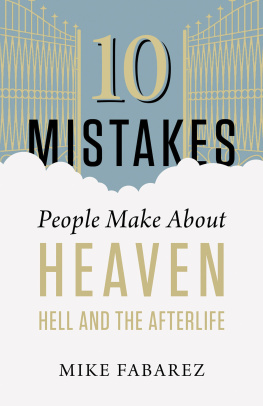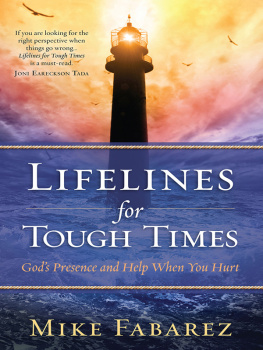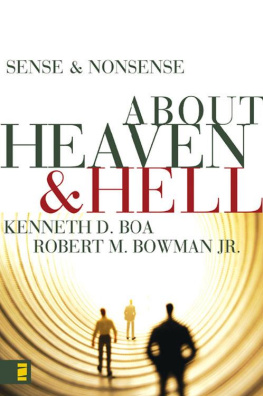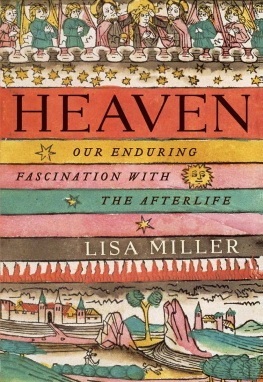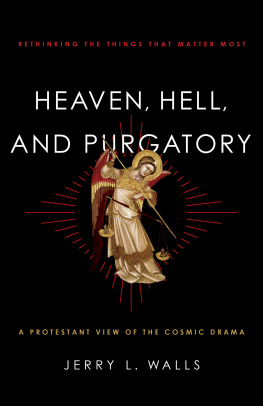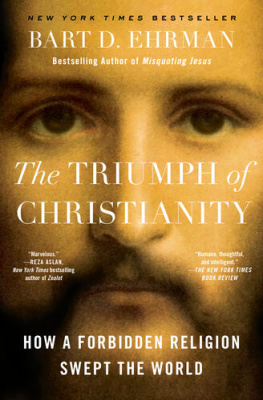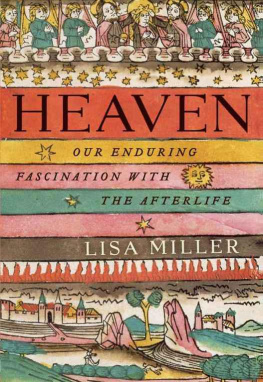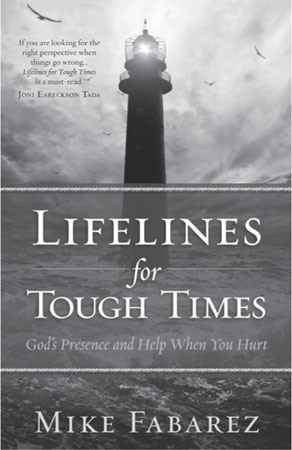
Lifelines for Tough Times
W hen hard times hit, we often find ourselves vulnerableto doubt, fear, worry, even depression. We ask, Does God care? Has He forgotten me?
So why does God allow suffering? Author Mike Fabarezwho is well acquainted with deep pain himself as the father of a special-needs child and as a pastor who has counseled many through lifes hurtslooks to the truths of Scripture for answers. Along the way, he shares
how complete trust in God alone can restore your confidence and hope
the power of focusing on Gods eternal goals for you in lifes temporary setbacks
Gods promise to love and protect you no matter what happens
This book will not only help you to understand why God allows sufferingit will provide you with the resources to stand strong, rest in Gods care, and endure!
B eing prepared for the afterlife ought to be everyones serious concern. Thankfully, God has given us clear instruction as to how we can be fully qualified for his coming kingdom, and have our appointment at the Great White Throne of his justice canceled once and for all.
THE FOUNDATIONAL INFORMATION
Before we can jump into the good news of the New Testament gospel, we must be careful to process the indispensable prologue that God set forth in the Old Testament.
1. God Is Our Creator
The Bible begins with the declaration that God is the originator of all things. And as such, God is our authority. He is in charge. By virtue of his position as our Creator, he is the One to whom we, his creatures, must give an account. This may be a hard truth for the independent, freedom-loving, twenty-first-century human to accept, but this is where all Christian theology beginsGod is the owner, rule-maker, and sovereign over each one of us.
2. God Is Holy
The Bible goes to great lengths to describe the absolute perfection of God. He is presented to us as morally and personally perfect in all that he is and does. The Lord himself is the standard of everything that can be described as good or right. While some of Gods attributes (such as his unrestricted power and his ability to be aware of all things in all places) cannot be shared by any of his creatures, many aspects of his nature become the reasonable and expected standard for each of us. For example, like him, we should be loving, truthful, and faithful.
3. We Are Sinful and Separated from God
The problem, of course, is that we are not holy in all of our behavior. We are quick to identify the moral imperfection of those around us, and if we are honest, we should be able to readily admit that we ourselves have fallen short of the standard of Gods holiness. While we could itemize a million negative consequences of this human sinfulness, the biggest consequence is that we are left separated from God. And because human sin stretches all the way back to Adam, we, as the human race, are all alienated from the perfect God who made us. While it is true that his goodness is undeservedly experienced in a number of ways, the fact remains that due to our sin we are not able to have the fellowship and the blessings we were created to experience with our Creator.
4. God Is Just
In chapter after chapter the Bible demonstrates that God is just. His justice is an expression of his perfection. In the same way a local judge in our county could not be a good judge if he gave a pass to every criminal that was hauled in before his tribunal, so God would sacrifice his perfection if he rewarded sinners as though they were righteous. God is a just God who must resolve the inequity that exists when wrongs are committed against his holy standard.
5. We Deserve Gods Punishment
The awful reality of coming to grips with our status as sinners is that we come to realize that there must be an ultimate accountability for all of our sinful thoughts, words, and actions. Because God has personally provided us the proper standard for our lives, and because our rebellion against that standard is a snubbing of him, the deserved punishment is much greater than most ever consider. Just as an angry act of rebellion against a coworker would justly require one degree of consequence, and an angry act of rebellion against the CEO would require another degree of consequence, our sins, which are ultimately against God, demand the most serious punishment of all.
6. God Is Loving
Up to this point, the picture painted by Scripture is a disheartening one. But thankfully, the Bible breaks through with hope for sinners. God reveals himself to be a loving God. His love is unparalleled. God, we are told, is so kindly committed to the well-being of his creatures that he has reached out to solve our ultimate problem at great personal cost to himself. In light of Gods intrinsic authority, holiness, and justice, he could, without any violation of his character, have decided to condemn the entire lot of his creatures to the just penalty for their sins. Thankfully, because of Gods incredible love, he has provided a solution.
THE GOSPEL
The good news of Gods solution for our dilemma is all about Jesus Christ. From Genesis to Revelation, the story of Gods redemptive work on behalf of sinners has been symbolized, narrated, prophesied, demonstrated, and explained as the story of Jesus coming to save sinners from the penalty of and enslavement to their sins.
1. Jesus Is God
It becomes clear, early on in the Bible, that only God himself is capable of solving the human problem. Sinful people are incapable of drawing themselves out of their sins or doing some sort of absolving work to compensate for their transgressions. In the New Testament, Jesus steps into time and space as the second Person of the Triune God to live as a participant of humanity in order to fulfill all the holy requirements of human righteousness. His status as the God-man not only secures success as the absolutely perfect human life, but it also makes the value of his death capable of being applied to millions of people.
2. Jesus Lived and Died as Our Substitute
Beginning with the early instructions of Old Testament worship, the requirement for a substitute was made clear. If we as sinners are to be gifted the blessings of life and fellowship with God, someone else must incur the penalty we deserve. While the sacrifices of spotless animals couldnt actually transact our forgiveness, it was a powerful symbolic image of the substitution that was needed. The perfect would need to be accepted as the substitute for the sinful. Christ came to live the life we should have lived so that it could be credited to us. More than that, Christ came to suffer the judgment for sin that we deserve so that we could be treated by God as though we had lived his sinless life.
3. Jesus Conquered Death for Us
The result of this work of Christ enabled God to justly set us free from the penalty of our sin. That penalty included both relational death (that is, broken fellowship with God) and biological death (that is, the permanent destruction of our bodies). With Gods justice being fully satisfied by the life and death of Christ, he demonstrated the reversal of the sentence of death by biologically raising Christ from the dead. Christs resurrection powerfully confirmed that he took care of our sin problem, and we can be assured that he will also take care of the problem of death. The historical proof of Christs victory over death proved that our sins had also been completely defeated, and became a major triumphal theme in the pages of the New Testament.
THE CALL OF THE GOSPEL
While all of the redemptive work was accomplished by Christ in history, its benefits are applied now to individuals as they respond appropriately to the message of the gospel. The Bible repeatedly calls each person to respond to this good news in two distinct yet inseparable ways.
Next page
